- Home
- Scott Westerfeld
Leviathan 01 - Leviathan Page 8
Leviathan 01 - Leviathan Read online
Page 8
“I can’t say anyone on that schooner would have been bothered by that kraken,” Deryn said. “Being killed a second time doesn’t hurt much.”
“Aye, it was us who did the damage. Barking brilliant, we are!”
The first bats were already fluttering home, which meant it was time for the midshipmen to climb down to get more feed. Deryn flexed her tired muscles. She didn’t want to slip and wind up down there with the kraken. The beastie was probably annoyed that its breakfast hadn’t contained any tasty crewmen, and Deryn didn’t fancy improving its mood.
In fact, watching the fléchette strike had left her shaky. Maybe Newkirk was itching for battle, but she’d joined the Service to fly, not to shred some poor buggers a thousand feet below.
Surely the Germans and their Austrian chums weren’t so daft as to start a war just because some aristocrat had been assassinated. The Clankers were like Newkirk’s mum. They were afraid of fabricated species, and worshipped their mechanical engines. Did they think their mob of walking contraptions and buzzing aeroplanes could stand against the Darwinist might of Russia, France, and Britain?
Deryn Sharp shook her head, deciding that war talk was all a load of blether. The Clanker powers couldn’t possibly want to fight.
She turned from the scattered wreckage of the schooner and scrambled after Newkirk down the Leviathan’s trembling flank.
Walking through the town of Lienz, Alek’s skin began to crawl.
He’d seen markets like this before, full of bustle and the smells of slaughter and cooking. It might have been charming from an open-air walker or a carriage. But Alek had never visited such a place on foot before.
Steam carts rumbled down the streets, spitting hot clouds of vapor. They carried piles of coal, caged chickens screeching in chorus, and overloaded stacks of produce. Alek kept slipping on potatoes and onions that had spilled onto the cobblestones. Slabs of raw meat swung from long poles that men carried on their shoulders, and pack mules prodded Alek with their loads of sticks and firewood.
But worst of all were the people. In the walker’s small cabin he’d grown used to the smell of unwashed bodies. But here in Lienz hundreds of commoners packed the
“THE STREETS OF LIENZ.”
Saturday market, bumping into Alek from all directions and treading on his feet without a murmur of apology.
At every stall people yammered about prices, as if obliged to argue over every transaction. Those that weren’t bickering stood around discussing trivialities: the summer heat, the strawberry crop, or the health of someone’s pig.
Their constant chatter about nothing made a certain sense, he supposed, as nothing important ever happened to common people. But the sheer insignificance of it all was overwhelming.
“Are they always this way?” he asked Volger.
“What way, Alek?”
“So trivial in their conversation.” An old woman bumped him, then muttered a curse under her breath. “And rude.”
Volger laughed. “Most men’s awareness doesn’t extend past their dinner plates.”
Alek saw a sheet of newsprint fluttering underfoot, half ground into the mud by a carriage wheel. “But surely they know what happened to my parents. And that war is coming. Do you suppose they’re really quite anxious, and only pretending not to worry?”
“What I suppose, Your Highness, is that most of them cannot read.”
Alek frowned. Father had always given money to the Catholic schools, and supported the idea that every man should be given a vote, regardless of station. But listening to the prattle of the crowd, Alek doubted that commoners could possibly understand affairs of state.
“Here we are, gentlemen,” Klopp said.
The mechaniks shop was a solid-looking stone building on the edge of the market square. Its open door led into a cool, mercifully quiet darkness.
“Yes?” a voice called from the shadows. As Alek’s eyes adjusted, he saw a man staring up at them from a workbench cluttered with gears and springs. Larger mechaniks lined the walls—axles, pistons, one entire engine hulking in the gloom.
“Need a few parts, is all,” Klopp said.
The man looked them up and down, taking in the clothes they’d stolen from a farmer’s washing line a few days ago. All three of them were still coated with yesterday’s dirt and shredded rye.
The shopkeeper’s eyes dropped back to his work. “Not much in the way of farm mechaniks here. Try your luck at Kluge’s.”
“Here’s good enough,” Klopp said. He stepped forward and dropped a money purse onto the workbench. It struck the wood with a muffled chunk, its sides bulging with coins.
The man raised an eyebrow, then nodded.
Klopp began to list gears and glow plugs and electrikals, the parts of the Stormwalker that had begun to wear after a fortnight of travel. The shopkeeper interrupted with questions now and then, but never took his eyes from the money purse.
As he listened, Alek noticed that Master Klopp’s accent had changed. Normally, he spoke in a slow, clear cadence, but now his words blurred and trilled with a common drawl. For a moment Alek thought Klopp was pretending. But then he wondered if this was the man’s normal way of speaking. Maybe he put on an accent in front of nobles.
It was strange to think that in three years of training Alek had never heard his tutor’s true accent.
When the list was done, the shopkeeper nodded slowly. Then his eyes flicked to Alek. “And perhaps something for the boy?”
He pulled a toy from the clutter. It was a six-legged walker, a model of an eight-hundred-ton land frigate, Mephisto class. After winding its spring, the shopkeeper pulled the key from its back. The toy began to walk, jerkily pushing its way through the gears and screws.
The man glanced up, one eyebrow raised.
Two weeks ago Alek would have found the contraption fascinating, but now the jittering toy seemed childish. And it was insufferable that this commoner was calling him a boy.
He snorted at the tiny walker. “The pilothouse is all wrong. If that’s meant to be a Mephisto, it’s too far astern.”
The shopkeeper nodded slowly, leaning back with a smile. “Oh, you’re quite the young master, aren’t you? You’ll school me in mechaniks next, I suppose.”
Alek’s hand went instinctively to his side, where his sword would normally have hung. The man’s eyes tracked the gesture.
The room was dead silent for a moment.
Then Volger stepped forward and swept up the money purse. He pulled a gold coin out and slapped it down onto the workbench.
“You didn’t see us,” he said, his voice edged with steel.
The shopkeeper didn’t react, just stared at Alek, as if memorizing his face. Alek stared back at him, hand still on his imaginary sword, ready to issue a challenge. But suddenly Klopp was pulling him toward the door and back out onto the street.
As the dust and sunlight stung his eyes, Alek realized what he’d done. His accent, his bearing…The man had seen who he was.
“Perhaps our lesson in humility yesterday was insufficient,” Volger hissed as they pushed through the crowds, heading toward the stream that would lead back to the hidden walker.
“This is my fault, young master,” Klopp said. “I should have warned you not to speak.”
“He knew from the first word out of my mouth, didn’t he?” Alek said. “I’m a fool.”
“We’re all three fools.” Volger threw a silver coin at a butcher and snatched up two strings of sausages without stopping. “Of course they’ve warned the Guild of Mechaniks to look out for us!” He swore. “And we brought you straight into the first shop we found, thinking a bit of dirt would hide you.”
Alek bit his lip. Father had never allowed him to be photographed or even sketched, and now Alek knew why—in case he would ever need to hide. And yet he’d still given himself away. He’d heard the difference in Klopp’s speech. Why couldn’t he have kept his own mouth shut?
As they reached the edge of the market,
Klopp pulled them to a halt, his nose in the air. “I smell kerosene. We need at least that, and motor oil, or we won’t get another kilometer.”
“Let’s be quick about it, then,” Volger said. “My bribe was probably worse than useless.” He shoved a coin into Alek’s hand and pointed. “See if you can buy a newspaper without starting a duel, Your Highness. We need to know if they’ve chosen a new heir yet, and how close Europe is to war.”
“But stay in sight, young master,” Klopp added.
The two men headed toward a stack of fuel cans, leaving Alek alone in the market’s crush. He pushed his way through the crowd, gritting his teeth against the jostling.
The newspapers were arrayed on a long bench, their pages weighted down with stones, corners fluttering in the breeze. He looked from one to the next, wondering which to choose. His father had always said that newspapers without pictures were the only ones worth reading.
His eyes fell on a headline: EUROPE’S SOLIDARITY AGAINST SERBIAN PROPAGANDA.
All the papers were like that, confident that the whole world supported Austria-Hungary after what had happened in Sarajevo. But Alek wondered if that were true. Even the people in this small Austrian town didn’t seem to care much about his parents’ murder.
“What’ll you have?” a voice demanded from the other side of the bench.
Alek looked at the coin in his hand. He’d never held money before, except for the Roman silver pieces in his father’s collection. This coin was gold, bearing the Hapsburg crest on one side and a portrait of Alek’s granduncle on the other—Emperor Franz Joseph. The man who had decreed that Alek would never take the throne.
“How many will this buy?” he asked, trying to sound common.
The newspaper man took the coin and eyed it closely. Then he slipped it into his pocket and smiled as though speaking to an idiot. “Many as you like.”
Alek started to demand a proper answer, but the words died on his tongue. Better to act like a fool than sound like a nobleman.
He swallowed his anger and filled his arms with one copy of every paper, even those plastered with photographs of racing horses and ladies’ salons. Perhaps Hoffman and Bauer would enjoy them.
As Alek glared at the newspaper man one last time, an unsettling realization overtook him. He spoke French, English, and Hungarian fluently, and always impressed his tutors in Latin and Greek. But Prince Aleksandar of Hohenberg could barely manage the daily language of his own people well enough to buy a newspaper.
They trudged along the streambed, the kerosene sloshing with every step, its fumes burning Alek’s lungs. With each of them carrying two heavy cans, the trip back to the Stormwalker already seemed much farther than the walk to town this morning.
And yet, thanks to Alek, they’d left behind most of what they needed.
“How long can we last without parts, Klopp?” he asked.
“Until someone lands a shell on us, young master.”
“Until something breaks, you mean,” Volger said.
Klopp shrugged. “A Cyklop Stormwalker is meant to be part of an army. We have no supply train, no tankers, no repair team.”
“Horses would have been better,” Volger muttered.
Alek shifted the burden in his grip, the smell of kerosene mixing with the smoked sausages that hung around his neck. His pockets were stuffed with newspapers and fresh fruit. He felt like some vagabond carrying everything he owned.
“Master Klopp?” he said. “While the walker’s still in fighting prime, why don’t we take what we need?”
“And bring the army down on us?” Volger asked.
“They already know where we are,” Alek said. “Thanks to my—”
“Listen!” Volger hissed.
Alek came to a halt…. He heard nothing but the fuel cans sloshing. He closed his eyes. A low thunder rumbled on the edge of his awareness. Hoofbeats.
“Out of sight!” Volger said.
They scrambled down the banks of the stream into the heavy brush. Alek crouched down, his heart beating hard.
As the sound of hoofbeats grew closer, the baying of hunting dogs joined in.
Alek swallowed—hiding was pointless. Even if the hounds didn’t have their scent, sausages and kerosene would make any dog curious.
Volger drew his pistol. “Alek, you’re the fastest. Run straight for the walker. Klopp and I will make a stand here.”
“But it sounds like a dozen horses!”
“Not too many for a walker. Get moving, Your Highness!”
Alek nodded and threw down the sausages. He dashed into the shallow water, feet slipping on wet stones. The dogs couldn’t track him across the stream, and the bank on the other side was flatter and clear of bushes.
As he ran, the sound of horses and dogs drew closer. A pistol shot cracked, and there were shouts and the whinny of a horse.
More shots sounded—the booming reports of rifles. Klopp and Volger were outgunned as well as outnumbered. But at least the horsemen were stopping to fight instead of chasing him. Common soldiers wouldn’t know who he was, after all. Maybe they wouldn’t bother with a young boy in farmer’s clothes.
Alek kept running, not looking back, trying not to imagine bullets slicing through his skin.
The stream ran among the farms, high grass on either side. He could just see the copse of trees where the walker was hidden—half a kilometer away. He lowered his head and ran harder, his focus narrowing to his boots and the stones along the stream bank.
Halfway to the trees an awful sound reached his ears—the hoofbeats of a single horse closing in. Daring a glance back, Alek saw a horseman on the other side of the stream, riding hard. His carbine strap was wound around one arm.
He was ready to fire….
Alek turned away and scrambled up the bank. The rye in the fields was chest high, tall enough to hide in.
A shot rang out—a geyser of dirt shot up a meter to his right.
He dove into the rye, thrashing away from the stream on hands and knees.
The carbine cracked again, and the bullet sliced past Alek’s ear. His instincts screamed to run farther in, but the horseman would see the tall grass moving. Alek froze where he was, panting.
“I missed you on purpose!” a voice called out.
Alek lay there, trying to regain his breath.
“Listen, you’re just a boy,” the voice continued. “Whatever those other two have done, I’m sure the captain will go easy on you.”
Alek heard the horse splash into the stream, in no hurry.
He began to crawl deeper into the rye, careful not to disturb the stalks. His heart was pounding, sweat running into his eyes. He’d never been in a battle like this before—outside the metal skin of the Stormwalker. Volger hadn’t let him carry a weapon into town, not even a knife.
His first time in single combat, and he was unarmed.
“Come on, boy. Don’t waste my time or I’ll thrash you myself!”
Alek came to a halt, realizing his one advantage—this young soldier didn’t know whom he was hunting. He was expecting some common ruffian, not a nobleman trained in combat since he was ten years old.
The man wouldn’t bargain on a counterattack.
The horse was moving into the rye now; Alek could hear its flanks parting the high stalks. The tall, gaudy plume of the rider’s helmet rose into view, and Alek dropped lower. The man was probably standing up in his stirrups to peer down into the grass.
Alek was on the horse’s left side, where the rider’s saber would be hanging. Not as good as a rifle, but better than nothing.
“Don’t waste my time, lad. Show yourself!”
Alek watched the plume of the horseman’s helmet, realizing that the curve of its tall feathers betrayed the direction he was facing. Standing up like that, he couldn’t be too steady.
Alek crawled closer, staying low, waiting for the right moment…
“I’m warning you, boy. Whatever you stole, it’s not worth getting shot for!”
He drew closer and closer to the horse, and at last the rider’s head turned the other away. Alek rose from the ground and ran a few steps, leaping at the man, grabbing his left arm and pulling hard. The horseman swore—then his carbine fired straight into the air. The explosion of noise startled the horse, which thrashed ahead through the rye, yanking Alek’s feet up into the air. Alek held on to the man’s arm with one hand, the other grabbing for the saber swinging wildly in its scabbard.
The rider twisted, trying to keep his feet in the stirrups. His elbow smashed down into Alek’s face like a hammer. Alek tasted blood, but ignored the pain, his fingers scrambling.
“I’ll kill you, boy!” the man shouted, one hand twisted in the reins, the other trying to bring the butt of the rifle down onto Alek’s head.
At last Alek’s hand closed on the hilt of the saber. He let go of the rider’s arm and dropped back to the ground, the steel singing as it drew. He landed beside the still-thrashing horse and spun on one foot, slapping the flat of the sword against the horse’s backside.
It reared up on its hind legs, the horseman crying out as he finally tumbled from his perch. The carbine flew from his grasp into the tall grass, and he landed with a heavy thud.
Alek slashed his way through the rye until he stood beside the fallen horseman. He lowered the saber’s point to the man’s throat.
“Surrender, sir.”
The man said nothing.
His eyes were half open, his face pale. He wasn’t much older than Alek, his beard wispy, his splayed arms thin. The expression on his face was so still….
Alek took a step back. “Are you hurt, sir?”
Something large and warm nudged him softly from behind—the horse, suddenly calm. Its nuzzle pushed against the back of Alek’s neck, sending a cold shiver down his spine.
The man didn’t respond.
In the distance, shots rang out. Volger and Klopp needed his help, now. Alek turned from the fallen rider and pulled himself up into the saddle. The reins were tangled and twisted, the horse unsteady beneath him.
Alek leaned down and whispered in its ear. “It’s all right. Everything’s going to be okay.”

 Uglies
Uglies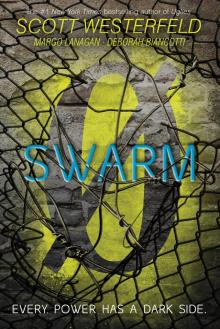 Swarm
Swarm Pretties
Pretties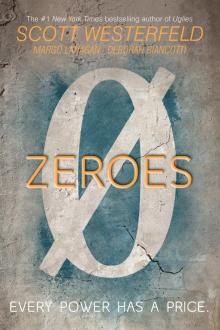 Zeroes
Zeroes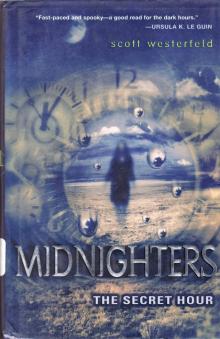 The Secret Hour
The Secret Hour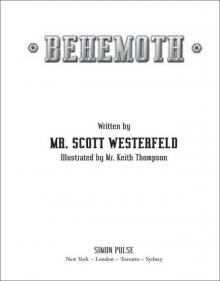 Behemoth
Behemoth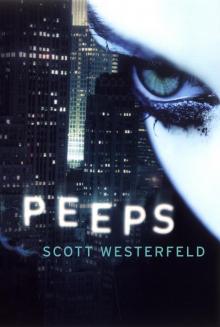 Peeps
Peeps Specials
Specials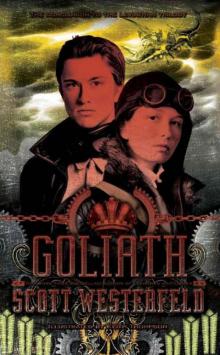 Goliath
Goliath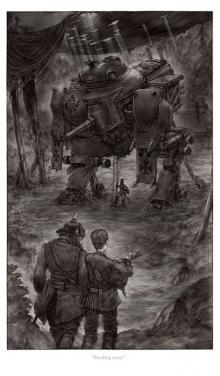 Leviathan
Leviathan Extras
Extras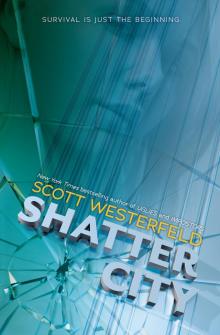 Shatter City
Shatter City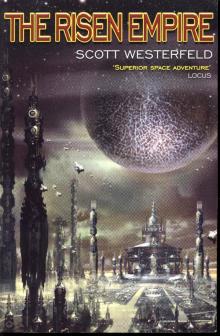 The Risen Empire
The Risen Empire Touching Darkness
Touching Darkness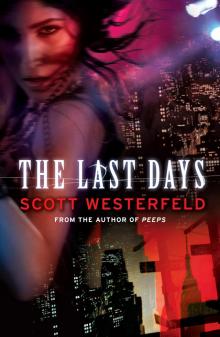 The Last Days
The Last Days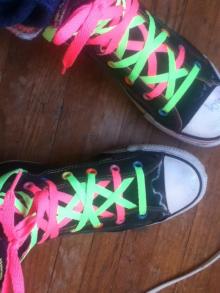 So Yesterday
So Yesterday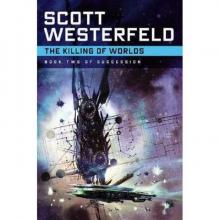 The Killing of Worlds
The Killing of Worlds Afterworlds
Afterworlds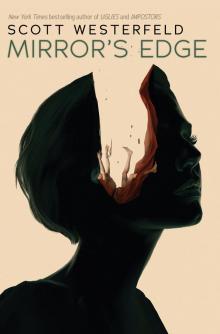 Mirror's Edge
Mirror's Edge Evolution's Darling
Evolution's Darling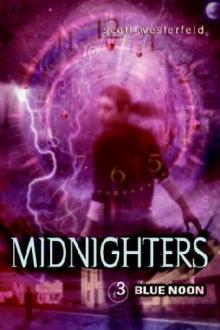 Blue Noon m-3
Blue Noon m-3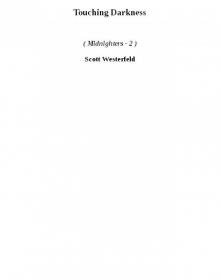 Touching Darkness m-2
Touching Darkness m-2 Impostors
Impostors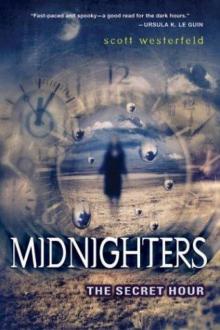 The Secret Hour m-1
The Secret Hour m-1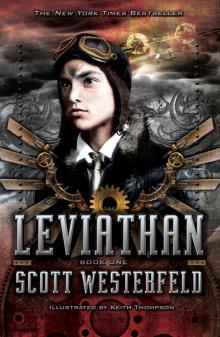 Leviathan 01 - Leviathan
Leviathan 01 - Leviathan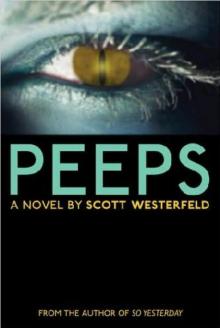 Peeps p-1
Peeps p-1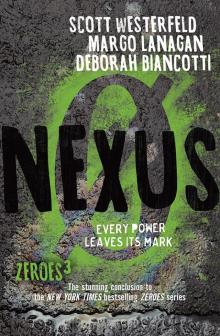 Nexus
Nexus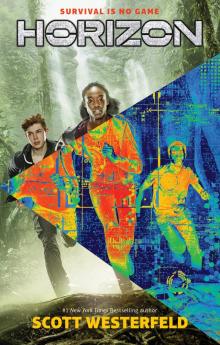 Horizon
Horizon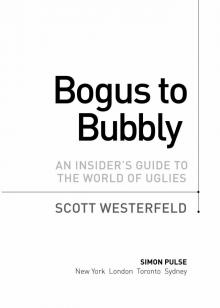 Bogus to Bubbly
Bogus to Bubbly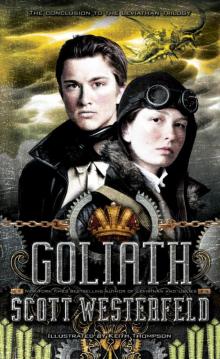 Goliath l-3
Goliath l-3 The Last Days p-2
The Last Days p-2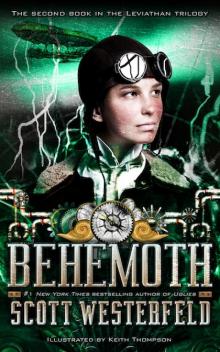 Behemoth l-2
Behemoth l-2 Stupid Perfect World
Stupid Perfect World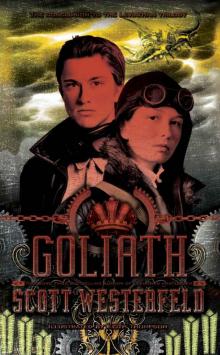 Goliath (Leviathan Trilogy)
Goliath (Leviathan Trilogy)